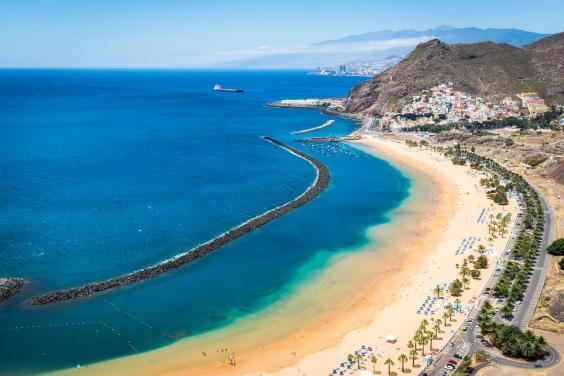Should I pay up now for my spring trip to Cornwall?
Simon Calder answers your questions on holiday rentals, Brexit complications and the red list travel ban


Q We have paid a deposit for an apartment in St Ives, Cornwall for a holiday in mid-spring, but the letting agent is asking for the final payment this week. Their terms and conditions offer a re-book or voucher in the event of further Covid restrictions. What should we do?
Roy J
A “Mid-spring” covers a multitude of possibilities, but I shall take it as meaning April. I believe it is very likely at some stage during that month that national travel within the UK, or at least England, will be allowed once again. So I hope your trip will go ahead as planned. But as the government keeps reminding us, “Going on holiday is illegal” – and there is currently no end date to that prohibition.
The general presumption is that if you are unable to take a UK holiday because of government action, the contract is regarded as “frustrated”. Because it cannot legally take place, everyone reverts to the financial position they were in before it was agreed: in other words, with the cash in your account, not that of the accommodation provider.
The Competition and Markets Authority (CMA) says: “For most consumer contracts, the CMA would expect a consumer to be offered a full refund where a consumer cancels, or is prevented from receiving any services, because government public health measures mean they are not allowed to use the services.”
But the key word there is “most”. For recently agreed bookings, it may be that the travel provider has a term in the contract saying something like: “If government action prevents you from making use of the booking, you can postpone or take a credit note but you can’t have your money back.” Your letting agent clearly has such a “no cash refunds” term. It is not unheard of for accommodation firms to seek to change terms retrospectively.
If you are in this position then I suggest you tell the letting agent you will pay the balance but expect a cash refund – in line with the original contract – if it cannot go ahead. But if you were made aware of the term at the time you agreed the rental, the best course of action is to ask if you may delay paying the balance until the situation becomes clearer. But you might ultimately need to decide whether to pay the remainder and accept a voucher/postponement, or surrender your deposit.

Q I am one of the many that came out to the Canary Islands back in the days of the tiered system just before the new year, on Jet2 from Leeds Bradford airport. Many of us are now facing the complication of the 90 days in 180 days rule.
Would it not be sensible if the current government would negotiate with the European Union to get the bloc to offer a period of grace until the airlines are up and running again? There are convoluted ways of getting back to Leeds but often the flight plan involves stops – and indeed if I travel via Dublin or Amsterdam, overnight stays. This is not a moan about costs – one travels during a pandemic at one’s peril. But the added risk of catching Covid-19 with all the various interactions involved should I feel be avoided. The rules are putting people at risk.
Robin H
A In the olden days of December 2020, before the government made all holidays illegal, it was perfectly acceptable to travel out to the Canary Islands from anywhere in tiers 1, 2 or 3 (even if the departure airport was tier 4).
Then came the end of the Brexit transition phase, and with it the right to unlimited stays in the European Union. As you know, Britons may stay only 90 days (about three months) in any 180 (six months) in the Schengen Area – comprising almost all the EU countries except Bulgaria, Croatia, Cyprus and Romania. (Ireland is also non-Schengen but is part of the Common Travel Area with freedom of movement to and from the UK and smaller islands.)
You are among the many British people who were in the Schengen Area on New Year’s Day and must leave the zone before 1 April – and will be unable to return until 30 June. But I am afraid I cannot see any grounds for renegotiation with the European Union. The UK government chose to end the right to free movement, and it is difficult to envisage British ministers even beginning a conversation which goes: “Even though we have chosen to become a third country, we would like to retain for a short time the right to stay as long as we like.”
It may be that some countries – in particular Spain – may indicate they will not initially be pursuing overstayers, but there is no guarantee of this. The only hope I can offer is for a significant alleviation of the current travel ban by late March, in which case the number of options for direct flights home may increase.

Q Last April my holiday to Spain was cancelled. We moved the booking to exactly a year later. I know Spain isn’t currently on the hotel-quarantine list. But hypothetically if Spain is added before we leave, or during our stay, are there any options to back out of the holiday or to claim on insurance? I will not be able to afford the £1,750 cost.
Colin
A Anyone arriving from 33 “high-risk” nations – of which Portugal is currently the only European country – will be required to book a “quarantine package” for a local hotel near their arrival airport for 11 nights. As you say, this will cost £1,750 for individual arrivals, with reductions for other people sharing the same room. The government says the aim is to reduce the risk of new variants of coronavirus being imported into the UK.
While nothing can be ruled out, I think the prospect of Spain being added to the list is extremely low. Spain is by far the most popular country for British holidaymakers, and also has a large population of UK expatriates. Agreed, it is a popular route back from Latin America, a region singled out for the so-called Brazilian variant. But I cannot envisage a situation in which the British government eases outbound travel restrictions – which will be necessary for you to go on holiday – yet also imposes extremely onerous conditions on anyone coming back from Spain.
Should I be wrong and hotel quarantine for Spain-UK travellers is imposed before you fly out, it is vanishingly unlikely that a reputable holiday firm would expect you to go; instead, you could expect all your money back (or decide on another postponement). And while the government makes it clear that additions to its “red list” can be made at any time, I believe that people in Spain would be given time to return: if not, the hotel quarantine system might simply collapse. You would be given a chance to get out ahead of the deadline, and I believe your holiday company would cooperate in helping you.
If I am also wrong about this prediction, I am afraid travel insurers would not help. In your position, the concerns I would have are different: will the UK government allow outbound travel by April? What requirements might Spain impose on incoming tourists? And how onerous will the UK’s testing requirements be for returning holidaymakers. All of those are currently unknowns.
Email your questions to s@hols.tv or tweet @simoncalder

Join our commenting forum
Join thought-provoking conversations, follow other Independent readers and see their replies
Comments